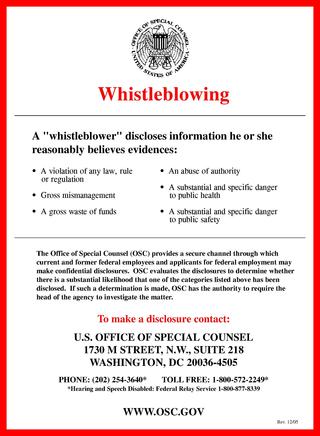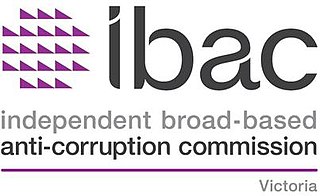Whistleblowing is the activity of a person, often an employee, revealing information about activity within a private or public organization that is deemed illegal, immoral, illicit, unsafe or fraudulent. Whistleblowers can use a variety of internal or external channels to communicate information or allegations. Over 83% of whistleblowers report internally to a supervisor, human resources, compliance, or a neutral third party within the company, hoping that the company will address and correct the issues. A whistleblower can also bring allegations to light by communicating with external entities, such as the media, government, or law enforcement. Some countries legislate as to what constitutes a protected disclosure, and the permissible methods of presenting a disclosure. Whistleblowing can occur in the private sector or the public sector.

The Personal Information Protection and Electronic Documents Act is a Canadian law relating to data privacy. It governs how private sector organizations collect, use and disclose personal information in the course of commercial business. In addition, the Act contains various provisions to facilitate the use of electronic documents. PIPEDA became law on 13 April 2000 to promote consumer trust in electronic commerce. The act was also intended to reassure the European Union that the Canadian privacy law was adequate to protect the personal information of European citizens. In accordance with section 29 of PIPEDA, Part I of the Act must be reviewed by Parliament every five years. The first Parliamentary review occurred in 2007.

The United States Office of Special Counsel (OSC) is a permanent independent federal investigative and prosecutorial agency whose basic legislative authority comes from four federal statutes: the Civil Service Reform Act, the Whistleblower Protection Act, the Hatch Act, and the Uniformed Services Employment and Reemployment Rights Act (USERRA). OSC's primary mission is the safeguarding of the merit system in federal employment by protecting employees and applicants from prohibited personnel practices (PPPs), especially reprisal for "whistleblowing." The agency also operates a secure channel for federal whistleblower disclosures of violations of law, rule, or regulation; gross mismanagement; gross waste of funds; abuse of authority; and substantial and specific danger to public health and safety. In addition, OSC issues advice on the Hatch Act and enforces its restrictions on partisan political activity by government employees. Finally, OSC protects the civilian employment and reemployment rights of military service members under USERRA. OSC has around 140 staff, and the Special Counsel is an ex officio member of Council of Inspectors General on Integrity and Efficiency (CIGIE), an association of inspectors general charged with the regulation of good governance within the federal government.

The Federal Accountability Act is a statute introduced as Bill C-2 in the first session of the 39th Canadian Parliament on April 11, 2006, by the President of the Treasury Board, John Baird. The aim was to reduce the opportunity to exert influence with money by banning corporate, union, and large personal political donations; five-year lobbying ban on former ministers, their aides, and senior public servants; providing protection for whistleblowers; and enhancing the power of the Auditor General to follow the money spent by the government.
Privacy law is a set of regulations that govern the collection, storage, and utilization of personal information from healthcare, governments, companies, public or private entities, or individuals.

The Whistleblower Protection Act of 1989, 5 U.S.C. 2302(b)(8)-(9), Pub.L. 101-12 as amended, is a United States federal law that protects federal whistleblowers who work for the government and report the possible existence of an activity constituting a violation of law, rules, or regulations, or mismanagement, gross waste of funds, abuse of authority or a substantial and specific danger to public health and safety. A federal agency violates the Whistleblower Protection Act if agency authorities take retaliatory personnel action against any employee or applicant because of disclosure of information by that employee or applicant.
The Public Service of Canada is the civilian workforce of the Government of Canada's departments, agencies, and other public bodies.
The Federal Accountability Initiative for Reform (FAIR) was a Canadian public interest organization and registered charity whose purpose was to support legislation and management practices that protect whistleblowers.
Christiane Ouimet was the first Public Sector Integrity Commissioner of Canada. She retired on October 18, 2010.
The Public Servants Disclosure Protection Act came into force in Canada on April 15, 2007. The Act creates two distinct processes: a disclosure process and a reprisal complaints process. It also creates two new bodies: the Office of the Public Sector Integrity Commissioner (PSIC) and the Public Servants Disclosure Protection Tribunal.

Corruption is an increasing issue across Canada. On Transparency International's 2023 Corruption Perceptions Index, Canada scored 76 on a scale from 0 to 100. When ranked by score, Canada ranked 12th among the 180 countries in the Index, where the country ranked first is perceived to have the most honest public sector. For comparison with worldwide scores, the best score was 90, the average score was 43, and the worst score was 11. For comparison with regional scores, Canada's score of 76 was the highest score among the countries of the Americas. Regionally, the average score was 43 and the lowest score was 13.

The Department of Defense Whistleblower Program in the United States is a whistleblower protection program within the U.S. Department of Defense (DoD) whereby DoD personnel are trained on whistleblower rights. The Inspector General's commitment fulfills, in part, the federal mandate to protect whistleblowers. It also administers the Defense Intelligence Community Whistleblower Protection Program (DICWP), as a sub-mission for the intelligence community. The Inspector General's Defense Criminal Investigative Service also conducts criminal investigations which rely, in part, on Qui Tam relators.
Military Whistleblower Protection Act of 1988 (MWPA), as amended at title 10, United States Code, Section 1034, and elsewhere, is an American law providing protection of lawful disclosures of illegal activity by members of the United States Armed Forces.
The Defense Intelligence Community Whistleblower Program (DICWP) is a sub-mission of the United States Department of Defense Whistleblower Program. In administering the DICWP, the Office of the Inspector General, U.S. Department of Defense (DoDIG) balances the competing national security and separation of powers interests raised by whistleblowing within the Defense Intelligence Community.The DoDIG provides a safe, authorized conduit for Defense Department whistleblowers to disclose classified information. The Inspector General also has authority to investigate whistleblowing reprisal allegations filed by civilian and military members of the Defense Intelligence Community. It therefore accepts the disclosures and provides source protection for those providing the information. The Department of Defense funds and supervises much of the Republic's intelligence gathering. DoD IG accordingly provides protection to a large number of civilian and military intelligence personnel.

A whistleblower is a person who exposes any kind of information or activity that is deemed illegal, unethical, or not correct within an organization that is either private or public. The Whistleblower Protection Act was made into federal law in the United States in 1989.
Whistle Blowers Protection Act, 2011 is an Act of the Parliament of India which provides a mechanism to investigate alleged corruption and misuse of power by public servants and also protect anyone who exposes alleged wrongdoing in government bodies, projects and offices. The wrongdoing might be in the form of fraud, corruption or mismanagement. The Act will also ensure punishment for false or frivolous complaints.

The Independent Broad-based Anti-corruption Commission (IBAC) is Victoria's anti-corruption integrity agency with jurisdiction over the public sector. It does this by:
Whistleblower protection in Australia is offered for certain disclosures under a patchwork of laws at both federal and state level. Eligibility for protection depends on the requirements of the applicable law and the subject matter of the disclosure. Not all disclosures are protected by law in Australia. At federal level, whistleblowers face potential imprisonment for making disclosures about certain subjects, including national security and immigration matters.
Mario Dion is a Canadian public servant who served as the second conflict of interest and ethics commissioner of Canada. He was appointed on January 9, 2018, succeeding Mary Dawson to a seven-year term. In February 2023, he resigned due to persistent health issues.

In Canada, a deferred prosecution agreement (DPA) or remediation agreement refers to an agreement under Part XXII.1 of the Criminal Code. The agreement is made between the Crown prosecutor and an organization alleged to have committed certain types of criminal offences, usually in the context of fraud or corruption, with the consent of the relevant Attorney General and under the supervision of a judge. Under a deferred prosecution agreement, the Crown prosecutor can agree to defer bringing a prosecution for the alleged offences if the organization takes steps to improve its conduct, makes restitution, and implements internal controls to avoid a repetition of the conduct.






